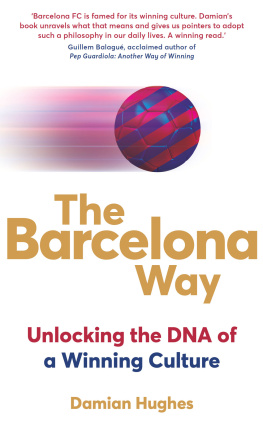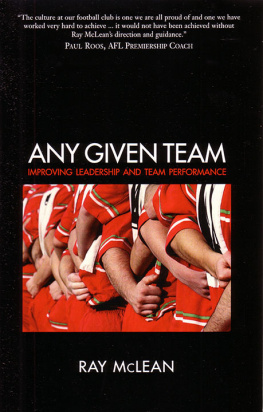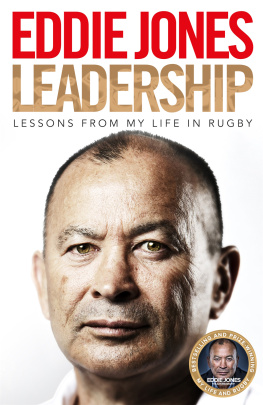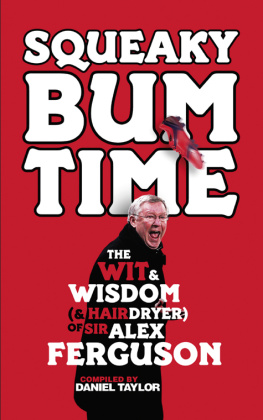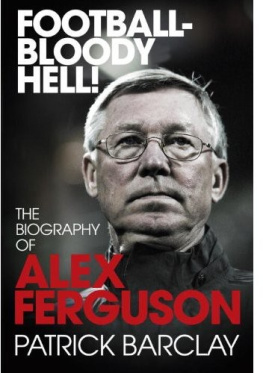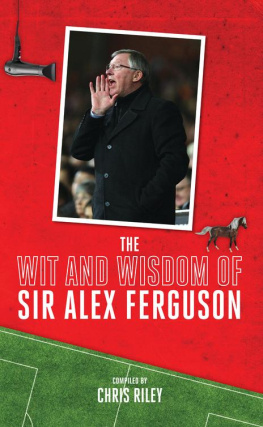How to Think Like
Sir Alex Ferguson
A fascinating insight into the mind and methods of the most successful coach in British history. Sir Alex Ferguson, as Damian Hughes so adeptly reveals, was not just a football manager. He was a lot more than that. Psychologist, motivator, mentor and disciplinarian, he perfected all of the attributes needed to be a successful manager in any business. And invented a few of his own.
Jim White, Telegraph
Elite coaching and leadership is about making the comfortable uncomfortable whilst helping the uncomfortable to become comfortable with change. Sir Alex Ferguson was the very best at that and Professor Damian Hughes has produced a compelling book which explains how he did this. I couldnt put it down and I am confident that you will find much in here to help you achieve success in your own chosen field.
Charles van Commenee,
UK Athletics and 2012 GB Olympic Head Coach
Damian Hughes challenges traditional coaching methods by encouraging coaches to maintain strong principles supported by self-awareness and the ability to adapt and change through the myriad of leadership challenges (and opportunities!). In this excellent book, Damians inquisitive and insightful mind breaks down one of the greatest coaches in the history of sport. With examples from Sir Alex Fergusons distinguished career, he masterfully illustrates a range of key principles which can be applied by any fan, coach or business leader.
Trent Robinson,
Head coach Sydney Roosters Rugby League,
Coach of the Year, 2014
How to Think Like
Sir Alex Ferguson
The Business of Winning and Managing Success
By Professor Damian Hughes

First published in 2014
by Aurum Press Ltd, 7477 White Lion Street, London N1 9PF
www.aurumpress.co.uk
This eBook edition first published in 2014
Copyright Damian Hughes 2014
Damian Hughes has asserted his moral right to be identified as the Author of this Work in accordance with the Copyright Designs and Patents Act 1988.
All rights reserved
Professor Damian Hughes combines his practical and academic background within sport, organisation and change psychology to work as a trusted adviser to the business, education and sporting elite, specialising in the creation of high performing cultures. He is the author of Liquid Thinking, Liquid Leadership and How to Change Absolutely Anything and three acclaimed sports biographies of Sugar Ray Robinson, Thomas Hearns and Marvin Hagler.
More information about his approach can be found at: www.liquidthinker.com
Professor Damian Hughes and Aurum Press Limited would like to make clear that neither Sir Alex Ferguson nor any organisation or person connected with him has in any way endorsed, approved or sanctioned this book. This book is entirely unofficial and is not connected with Sir Alex Ferguson, in any way.
This eBook is copyright material and must not be copied, reproduced, transferred, distributed, leased, licensed or publicly performed or used in any way except as specifically permitted in writing by the publishers, as allowed under the terms and conditions under which it was purchased or as strictly permitted by applicable copyright law. Any unauthorised distribution or use of this text may be a direct infringement of the authors and publishers rights, and those responsible may be liable in law accordingly
eBook conversion by Quarto Publishing Group USA
Digital edition: 978-1-78131-380-0
Contents
Preface
What does successful change look like?
Many of us grow up instinctively believing that successful change can best be described as a direct trajectory where sufficiently determined performance leads to the inevitable desired outcome.
Its a myth.
Harvard professor Rosabeth Moss Kanter highlights how everyone loves and remembers inspiring beginnings and happy endings. It is the part in between we often fail to appreciate, where the hard work kicks in and the tough challenges emerge. At these moments, we experience Kanters Law: Everything can look like a failure in the middle. Sir Alex Ferguson understood this law, not least because he spent a large part of his Manchester United career successfully battling his way through it. He preferred to explain this philosophy with the more prosaic: Success doesnt happen in straight lines.
Ferguson had taken over at United when the club was at perhaps its lowest point since the tragedy of the Munich air disaster. It had experienced a startling fall from grace since the European Cup triumph of 1968, and had not won an English League title in nearly twenty years. By prioritising the development of young players, rebuilding the team, being shrewd in the transfer market, emphasising attacking football and bringing the best out of his players, Ferguson eventually turned Uniteds fortunes around. He delivered football of rare beauty. He bought Eric Cantona, the rebel with a cause. He nurtured the Golden Generation. He discovered Ole Gunnar Solskjaer, the baby-faced assassin. He signed Wayne Rooney, the assassin-faced baby. He brought trophies, glory, prestige and the kind of happiness, over twenty-six years, that United supporters had once only dreamed of. No one has managed at the highest level for so long. Or with such competitive courage. Nobody has beaten the system the way he has and accumulated so many trophies.
Two decades on, Old Trafford is a gleaming allseater stadium. Its capacity has risen from 56,000 to 76,000 and the Keep Off The Grass signs are in five different languages. It has been an epic journey of 6 a.m. starts, nerve-shredding football and relentless drama. Before his retirement in May 2013, Ferguson outlasted thirteen different Manchester City managers. He saw off Prime Ministers Thatcher, Major, Blair and Brown. He was knighted and immortalised in bronze, and he turned United into one of the most prolific trophy-grabbing machines in the modern game. Thirteen League titles, two European Cups, five FA Cups, one European Cup Winners Cup, two League Cups, plus enough individual awards to fill a museum it amounts to an overall haul nearly double that of the next most successful English club manager.
Yet he did not have it all his own way. Over the years he had to learn to manage his own very human fears and insecurities whilst attempting to convince a demanding and sceptical public and media that he knew what he was doing. He also had to respond to several major challengers: besides seeing United replace close rival Liverpool FC as the club holding the most English League titles, he successfully battled the fluid style of play which had brought London-based Arsenal FC three titles in the late 1990s and early 2000s, triumphed over the hundreds of millions of dollars Russian billionaire owner Roman Abramovich had invested in Chelsea FC, and in his final season took the championship from Manchester City, the home town rivals he once famously referred to as Uniteds noisy neighbours, who had switched owners and invested unprecedented amounts of money in new players.
Sir Alex Ferguson was a manager of uncommon ability.
Yet Ferguson was far more than a manager. He played a central role in the whole Manchester United organisation, managing not just the first team but the entire club, casting it in his own image. If all institutions take their lead from the head for example, Virgin is perceived as the gutsy underdog; slightly dippy, eccentric, a corporation with a beard and sweater, like Sir Richard Branson, its boss then at Fergusons Manchester United, everyone had to embrace change. Steve Jobs was Apple; Sir Alex Ferguson is Manchester United, said the clubs former chief executive David Gill and if there was one quality that defined his success, it was the tremendous capacity to adapt and keep performing as the game has changed. In his own reflections on how he achieved such unprecedented success, Ferguson maintained that, The thing Ive done well over the years is manage change. You control change by accepting it. Most people dont look to change. But I always felt I couldnt afford


